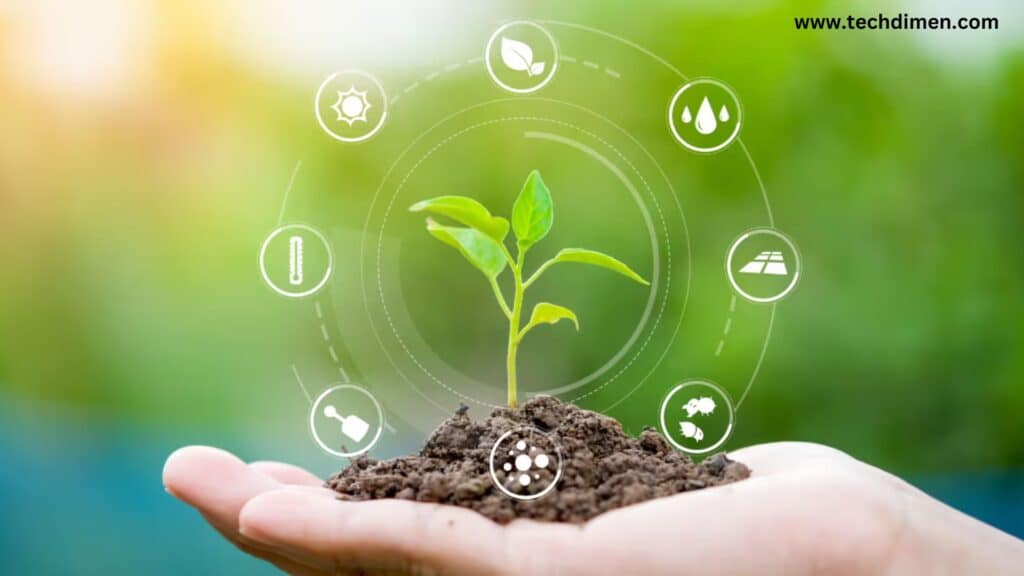The transformation of agriculture in 2025 is heavily driven by the integration of seed technology and agricultural innovation. As the world’s population continues to grow and the climate becomes increasingly unpredictable, the role of seed breeding technology, smart seeds, and precision agriculture becomes essential. These technologies are no longer just futuristic ideas; they are actively shaping farms around the world today.
the Role of Seeds in Modern Agriculture
Seeds are the fundamental building blocks of agriculture. Each seed contains a carefully mapped genetic structure that dictates the plant’s growth, nutritional value, resistance to disease, and yield potential. Modern high yield seeds specifically engineered to produce more food while using fewer resources. These seeds are the result of long standing research in crop genetics and hybrid seed development.
A high quality seed defined by its genetic stability, germination rate, and ability to thrive under certain soil and climatic conditions. The quality of the seed directly influences the productivity of the farm and determines how much water, fertilizer, and pest control will be needed throughout the crop’s lifecycle.
There is an ongoing debate between the use of hybrid seeds and genetically modified seeds. Hybrid seeds created through selective cross-breeding of parent plants and typically produce stronger, more uniform crops. Genetically modified organisms, or GMOs, altered at the DNA level to introduce traits such as pest resistance or herbicide tolerance. While both methods aim to improve plant performance, GMOs often face tighter regulations and public skepticism.
Inferior seeds can lead to poor crop performance, inconsistent yields, and increased reliance on agrochemicals. However, seeds bred for climate resilience can endure drought, resist pathogens, and even grow faster, thus supporting modern farming demands.
Emerging Technologies in Seed Science

Recent advances in genetic seed engineering are revolutionizing agriculture. CRISPR technology, which allows for precise genome editing, has enabled scientists to add or remove specific traits in seeds. The result is crops that can withstand disease without the need for chemical treatments and that can adapt to various environmental challenges.
Smart seeds represent another leap in seed science. These are biologically or digitally programmed to respond to environmental triggers such as extreme heat, drought, or soil salinity. By embedding genetic intelligence into the seed itself, smart seeds offer farmers a reliable tool for navigating uncertain climate conditions.
While traditional plant breeding methods still play a role, bioengineering significantly shortens the breeding cycle. Traits that once took several generations to develop can now be edited into a seed’s genome in a single iteration. Both traditional and bioengineered methods are valuable depending on the desired traits and farming goals.
Digital Tools Enhancing Seed Production

The integration of digital tools into agriculture has accelerated the pace of seed innovation. Artificial intelligence and data analytics allow researchers to simulate thousands of genetic combinations before conducting field trials. This speeds up the identification of the most promising seed variants.
Seed traceability is gaining attention through the use of blockchain technology. By tracking every stage of a seed’s lifecycle, from development to planting, blockchain provides transparency and builds trust among producers, farmers, and consumers. It ensures the authenticity and genetic integrity of seeds.
Top Companies and Startups Leading Seed Tech Innovation

Established companies like Bayer, Corteva Agriscience, and Syngenta are leading efforts in genetic seed engineering and AI powered seed development. These organizations invest heavily in CRISPR research and digital farming platforms.
New seed tech companies are also making headlines. Inari Agriculture uses machine learning to design gene edited seeds tailored for specific environments. Pairwise applies CRISPR to enhance fruit quality, such as improving flavor and extending shelf life. These companies are attracting significant venture capital, a sign of strong confidence in the future of seed innovation.
The global seed technology market is expected to exceed $110 billion by 2027, driven by the growing demand for food security and climate resilient crops. With more regions experiencing extreme weather, the need for robust and adaptive seeds has never been greater.
Environmental and Ethical Considerations

As seed technology evolves, it raises important environmental and ethical questions. Seed patents, particularly for genetically engineered varieties, have sparked debates about farmer autonomy and corporate control. While patents protect innovation, they can also restrict seed saving and replanting.
Monocultures, often encouraged by the use of high yield seeds, can reduce biodiversity and increase vulnerability to disease.
Organic seeds, cultivated without genetic modification or synthetic chemicals, are gaining popularity. They are often used in regenerative farming practices, which emphasize soil health, crop rotation, and long term sustainability.
The Future of Seed Technology

Agriculture is changing fast, and at the center of it all is seed technology. The future holds exciting breakthroughs that will help farmers grow more food, even in tough conditions, while keeping the environment in mind. Let’s explore how seeds are evolving to meet the challenges ahead.
Smarter, Stronger Seeds
Tomorrow’s seeds will be built for survival. With advances like CRISPR gene editing, scientists can now adjust a seed’s DNA more precisely than ever. This means crops that resist drought, fight off pests, and grow better in poor soils. These aren’t the old-school GMOs people debated about this a cleaner, faster way to boost natural strengths.
Seeds That Withstand Climate Change
As the weather gets more unpredictable, farmers need seeds that can handle it. Seed technology is focusing on crops that survive in heat, dry spells, or salty soils. This helps protect harvests, even when nature doesn’t cooperate.
High Tech Seed Coatings
Seed coatings are no longer just for protection. Future coatings will carry nutrients, pest blockers, and even tiny sensors to help crops grow better. Some coatings slowly release fertilizers right where the plant needs them, cutting waste and improving growth from day one.
Data Powered Seed Innovation
Big data is reshaping how new seeds are created. Scientists can now study soil conditions, climate trends, and crop performance across millions of acres. This helps design seeds perfectly suited to different regions, speeding up development and boosting success rates.
Seeds Designed for Precision Farming
New seeds will work hand-in-hand with modern tools like drones, soil scanners, and AI systems. When seeds, data, and machines work together, crops grow more efficiently, using less water, fewer chemicals, and fewer resources.
Traceable Seeds Through Blockchain
Farmers deserve to know exactly where their seeds come from. Blockchain technology will secure the seed supply chain, tracking every step from lab to farm. This means more reliable seeds, better harvests, and protection against fraud.
Boosting Nutrition Through Seed Science
Future seeds won’t just grow more food they’ll grow better food. Scientists are developing seeds that produce crops with higher levels of vitamins, minerals, and essential nutrients. This helps fight malnutrition, especially in communities where food variety limited.
Seeds That Heal the Soil
The next generation of seeds isn’t only focused on yields. Some seeds are designed to rebuild soil health, reduce the need for fertilizers, and even capture carbon from the atmosphere. These seeds support regenerative farming and healthier ecosystems.
Microbe-Enhanced Seeds
Good microbes help plants thrive. Seed technology is tapping into this by engineering seeds to carry beneficial microbes from the start. These microbes help crops absorb nutrients, fight off disease, and grow stronger with fewer chemicals.
Making Better Seeds Available to Everyone
Seed technology isn’t just for large farms. Affordable solutions, community seed banks, and mobile apps are helping small farmers access better seeds too. The future is about making these innovations available to growers everywhere, not just in high-tech farms.
Looking Ahead
The future of seed technology is about more than just growing more crops. It’s about creating seeds that adapt to the world’s changing need resilient, nutritious, efficient, and sustainable.
Optimization Tips for Seed Technology Content
Publishing agricultural content online requires a focus on speed and clarity. Use Web image formats to reduce load times and ensure that all media loads dynamically. Clean HTML and mobile-first design frameworks provide a seamless user experience across devices.
From an SEO standpoint, structured data using schema.org tags improves search engine visibility. Deploy caching and content delivery networks to distribute content globally. Effective metadata and internal linking strategies boost discoverability and reader retention.
Table 1: Types of Seed Technologies
| Type | Description | Use Case |
|---|---|---|
| Hybrid Seeds | Cross-bred for specific traits | High yield, uniform crops |
| Genetically Modified (GMO) | DNA altered with foreign genes | Pest resistance, herbicide use |
| Gene-Edited (CRISPR) | Precise edits within native genes | Drought tolerance, speed to grow |
| Organic/Open-Pollinated | Naturally pollinated, can be saved | Organic farms, biodiversity |
| Smart Seeds | Paired with digital tools or coatings | Precision farming, data syncing |
FAQs
What is the role of technology in modern seed production?
Technology plays a vital role in enhancing seed production by improving seed quality, boosting yields, and ensuring genetic purity. Advanced techniques like precision farming, biotechnology, and automated processing help farmers produce healthier, more resilient crops.
How does seed technology impact food security?
Seed technology contributes significantly to global food security by developing high-yield, disease-resistant, and climate-tolerant seed varieties. This ensures a stable food supply even under challenging environmental conditions.
What are genetically modified seeds?
Genetically modified seeds produced by altering the DNA of plants to introduce desirable traits such as pest resistance, drought tolerance, or enhanced nutritional value. These seeds undergo strict testing before commercial release to ensure safety and effectiveness.
Are hybrid seeds the same as genetically modified seeds?
No, hybrid seeds result from cross-breeding two different plant varieties to combine favorable traits, while genetically modified seeds involve direct genetic alteration in a laboratory setting. Both methods aim to improve crop performance but use different processes.
Why is seed quality important for agriculture?
High-quality seeds are essential for achieving better germination rates, stronger plant growth, and higher yields. They reduce the need for excessive fertilizers or pesticides, making farming more sustainable and profitable.
How does technology assist in seed testing and certification?
Modern seed testing uses technologies like genetic markers, digital imaging, and automated analysis to verify seed purity, germination potential, and disease resistance. Certification programs rely on these tests to guarantee the quality farmers expect.
Can technology help small scale farmers access better seeds?
Yes, digital platforms, mobile apps, and local seed banks supported by technology enable small-scale farmers to access high-quality seeds, up-to-date information, and expert advice, empowering them to improve productivity.
What is precision agriculture, and how does it relate to seeds?
Precision agriculture uses technology like GPS mapping, drones, and data analytics to optimize planting, irrigation, and fertilization. It ensures seeds are planted at the right depth, spacing, and conditions, maximizing their potential.
Are there environmental concerns linked to seed technology?
While seed technology can reduce pesticide use and increase yields, some concerns include biodiversity loss, dependency on patented seeds, and potential ecological impacts of genetically modified crops. Regulatory oversight helps address these issues.
How is biotechnology shaping the future of seeds?
Biotechnology is advancing rapidly, enabling the development of seeds that can withstand harsh climates, resist diseases, and deliver higher nutritional content. It holds promise for meeting the demands of a growing global population while minimizing environmental impacts.
Conclusion
The convergence of seed technology and agricultural innovation is reshaping global food systems. Through CRISPR, AI driven breeding, and blockchain-based traceability, seeds are becoming smarter, more productive, and more adaptable. Farmers, scientists, and agri tech companies must collaborate to ensure these innovations are accessible and sustainable. By prioritizing ethical biotech, regenerative farming, and digital tools, the future of farming becomes more resilient and equitable.

Jhon AJS is a tech enthusiast and author at Tech Dimen, where he explores the latest trends in technology and TV dimensions. With a passion for simplifying complex topics, Jhon aims to make tech accessible and engaging for readers of all levels.







